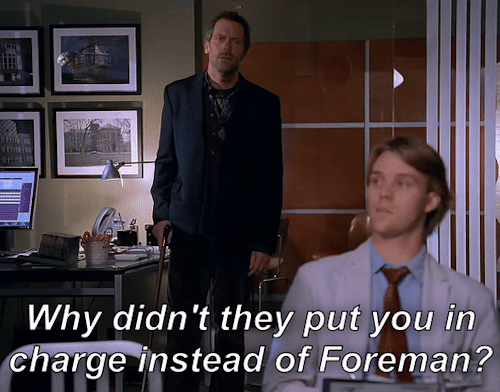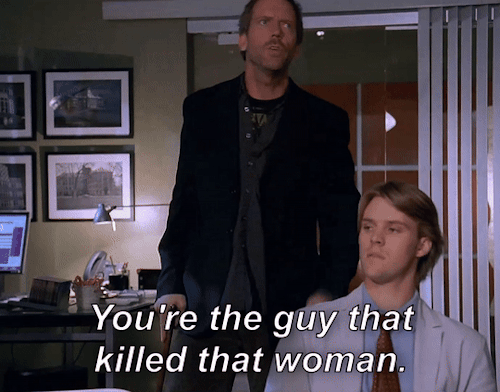Waithtron - All And Always In NY

More Posts from Waithtron and Others
The Watch Kutner Gave House



It's Casio SPF-40-V1. It's pretty snazzy with triple sensors and whatnot. 100m water resistance. Not particularly needed features if you're not into outdoor sports, and it makes the watch look bulky, but Kutner would have thought it was cool Just Because and House appreciated it.
according to timepiece nerds on the internet this is god tier watch but idk if they're srs or not lol


House was wearing a different watch in season 4 episode 10 where secret Santa happened and in season 4 episode 11 he is wearing a this watch. This is probably what Kutner bought House for secret Santa, and House began to wear it immediately. (It's also way over the price limit for secret Santa. I don't know how much it actually was, and I do need to consider that it was in 2007 money, but I am pretty sure it was more than $25 or even $50 or $60.) This is why he was like this in Frozen.


House wears this watch all the way through end of season 6. I just know he thought about Kutner every time he put it on. I think he goes back to the old watch some time in season 7.
The last two seasons have one of, if not the worst version of John Watson I've ever seen. His personality, actions, his relationship with Sherlock - never thought it was possible to misinterpret something this much. I'm not even going to get started with all that Mary drama.
It really infuriated me to see all the buildup get thrown out the window for shipping propaganda. Even more because, as bad as seasons 3 and 4 were, it was obvious they still knew how to keep the good writing. Hell, Sherlock and Lestrade's dynamic is a proof of that. I wouldn't say it was perfect, of course, but it was solid and well-established.
Re-watching the series again, it honestly looks as if Lestrade was Sherlock's actual friend (or soulmate, depending on how you want to see it), not John.
And as weird as it seems, this is very refreshing to me. It would be very interesting to have a series where the two main characters, despite always working together, have their best, strongest relationships with other people. (That's why I've always loved Sherstrade as a dynamic)
Loved your analysis. Great post, honestly.
One undeath, two very different reactions.

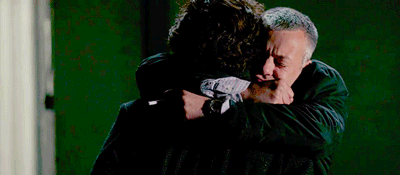
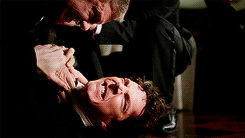
I hear people say that Sherlock should have told John about the snipers, or that John's reaction is justified because Sherlock didn't begin his narration with his duress as requested, or that John is justified by the insensitive nature of Sherlock's re-introduction.
But here's the thing.
Sherlock also pranked Lestrade: saying "those things will kill you" and stepping out of the dark dramatically, then not even getting Greg's name right in saying he'd "let things slide." Lestrade had and was given as little information as John was.
But whereas John reacts with anger and demands for an explanation, and holds on to that grudge for half the episode, Lestrade reacts with relief and joy and has no grudge whatsoever under the exact same reveal circumstances.
Lestrade assumes that Sherlock wouldn't have faked his death without a damn good reason, and he treats Sherlock accordingly.
John, on the other hand, assumes that Sherlock did not have a good enough reason. He demands a justification, and continues to react violently when he isn't satisfied with the attempts at explanation he's given. Even after he is given an explanation off-screen -- he couldn't have known enough to describe Sherlock's activities in the two years as "hide-and-seek" otherwise -- and even after ostensibly forgiving Sherlock enough to work with him again, John barely considers Sherlock's reason for "letting me grieve" sufficient.
And here's the other thing.
John wasn't told Sherlock was taking down Moriarty's network and wasn't included. He was lied to. He grieved.
Sherlock did so much worse to Lestrade. He left Greg holding the bag.
In a criminal investigation, suicide can be interpreted as a confession or as an acknowledgment of guilt. That's why Moriarty wanted Sherlock to do it. Sherlock was being investigated for having perpetrated the crimes he solved and then solving them to fraudulently take the credit.
As we see in ASIB, Lestrade is the one who convinced other detectives to use Sherlock, and he uses him the most often (to the point that in TBB, Sherlock is unpleasantly surprised Lestrade isn't there). So if Moriarty's allegations were true, either Lestrade is a terrible detective who did not notice he was being taken for a ride, or else he was an accomplice and also enjoying the fraudulent rewards. If Sherlock is a fraud, Lestrade is a fraud. By faking his death, Sherlock as good as confessed. If John told anyone about that stupid phone call, he straight up confessed.
Lestrade could have lost his badge. Lestrade could have gone to prison.
Secondly, the Chief Superintendent did not know that Lestrade and the other detectives were using Sherlock despite Sherlock's established fame. That means that Sherlock's assistance was either "eyes no hands" -- Lestrade presenting Sherlock's conclusions as his own work, probably more true prior to the blog since afterward it was impossible -- or else Lestrade and John were making it look like Sherlock was stumbling into police investigations while doing unrelated private detective work. (That puts Lestrade on the knife edge of perjury, which again, had now come to light and Sherlock wasn't there to help clean up the mess. At the very least, Lestrade failed to disclose information to the prosecutor and to the defense.)
What all that means, is that Lestrade got the Met into this Sherlock-is-a-fraud mess without running it by Legal, without giving the Met an opportunity to decline, or even letting them know Lestrade was taking the risk and increased liability.
Sherlock's confession to being a fraud would put every case he'd ever worked on under suspicion. They'd all have to be re-tried, and potentially re-tried with any evidence Sherlock was responsible for excluded. Lestrade, the Crown, and the Met would have had to defend every case they'd worked together in addition to proving that Moriarty actually was the villain and all this was fake.
And again -- Lestrade got the Crown and the Met into this mess without permission from his superiors. The other detectives could also have thrown Lestrade under the bus as the senior DI who urged them to use Sherlock's help. We don't know.
I cannot emphasize enough how fired Lestrade would have been in reality-land. (Since he was not, we may infer that he is canonically capable of talking his way out of literally anything.)
And Sherlock wasn't there to help for any of it. He confessed and fucked off for two years. Lestrade had to keep himself out of jail and from being fired and keep everyone they'd put away in prison alone (in the sense of their partnership).
Sherlock didn't ask before leaving Lestrade holding the bag. He didn't even do Lestrade the courtesy of the phone call John got. He just hauled off and did it.
Lestrade had infinitely more reason to be angry and suffered objectively more harm by the way Sherlock handled Moriarty.
Yet, Lestrade presumes that Sherlock wouldn't have done that to him if he could have avoided it. He is just happy Sherlock isn't actually dead.
John does not and is not.
I do not buy that John was sufficiently provoked to make his violence justified or in any way "to be expected." And if the show was trying to show us that John is Sherlock's soulmate, that was a piss-poor way to do it.
It is also worth noting, because fuck Season 3 & 4 John forever, that the first time we see Lestrade hug Sherlock is when he's back from the dead.
The first time we see John hug Sherlock? Is after Sherlock delivered a self-deprecating speech that was entirely complimentary to John.
Fuck you, John Watson.
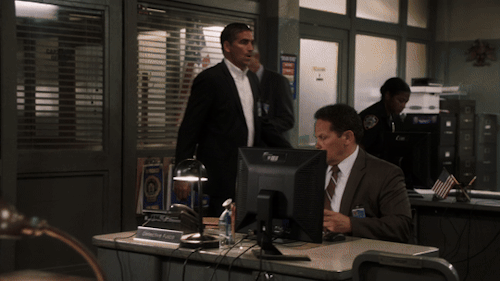

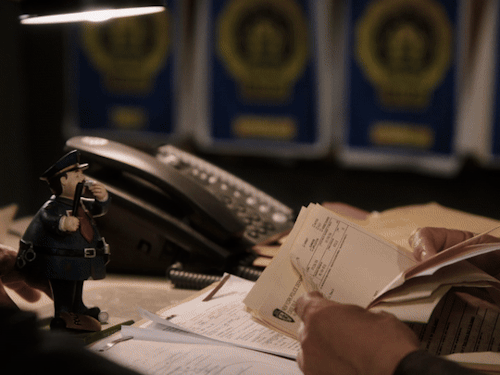

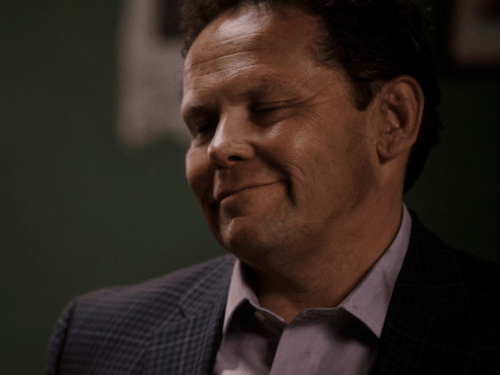

FUSCO & REESE — s04e03 "Wingman"
This episode made me lose my mind. The whole partner thing between them was fine, but fuck Reese was being so suggestive the entire time. Like, I get he's supposed to be a whisper-in-yo-ear fuckboy with everybody, but c'mon - the gifs speak for themselves.





The og horror movie brat
![TOMMY LEE JONES & ROBERT DOWNEY JUNIOR — U.S Marshals [1998]](https://64.media.tumblr.com/07cbf498e3ef2d6b40bbb31a3447e7f9/99de2f6c04be76ac-79/s500x750/a359730f08397ad2f71ae4cb2c6ca34d2b0fe019.gif)
![TOMMY LEE JONES & ROBERT DOWNEY JUNIOR — U.S Marshals [1998]](https://64.media.tumblr.com/9891ab345fe698f3c94cda99d0c3a5c8/99de2f6c04be76ac-c9/s500x750/67c627bb32c7a59ffcb9bc12f96b6f48c6192928.gif)
![TOMMY LEE JONES & ROBERT DOWNEY JUNIOR — U.S Marshals [1998]](https://64.media.tumblr.com/d85d7b2c1c662c76e3058ddf8d2a892d/99de2f6c04be76ac-06/s500x750/f0f378b34e29ecad320fdcc1abf149b43172b037.gif)
![TOMMY LEE JONES & ROBERT DOWNEY JUNIOR — U.S Marshals [1998]](https://64.media.tumblr.com/e44cf5205d4d86be22592183b8e390e8/99de2f6c04be76ac-77/s500x750/15f20fba4d3cb6d68f3e685a317e217f7b858148.gif)
![TOMMY LEE JONES & ROBERT DOWNEY JUNIOR — U.S Marshals [1998]](https://64.media.tumblr.com/3839606d9fafb2d605394f063ea3d3fb/99de2f6c04be76ac-c7/s500x750/b849400c8f1271e9fb773cd357509a35b121e266.gif)
![TOMMY LEE JONES & ROBERT DOWNEY JUNIOR — U.S Marshals [1998]](https://64.media.tumblr.com/b5bfe9328422b3f03a0f14b349b47d1d/99de2f6c04be76ac-3a/s500x750/8813642fc65d52a98720a31b1bafaa6084a1bd3e.gif)
TOMMY LEE JONES & ROBERT DOWNEY JUNIOR — U.S Marshals [1998]
-
 j0jorocity liked this · 2 days ago
j0jorocity liked this · 2 days ago -
 abysssmol liked this · 3 days ago
abysssmol liked this · 3 days ago -
 just-phantom-things liked this · 3 days ago
just-phantom-things liked this · 3 days ago -
 depravedjester liked this · 3 days ago
depravedjester liked this · 3 days ago -
 swagspectrum liked this · 3 days ago
swagspectrum liked this · 3 days ago -
 not13opossums reblogged this · 3 days ago
not13opossums reblogged this · 3 days ago -
 not13opossums liked this · 3 days ago
not13opossums liked this · 3 days ago -
 picodepineapple liked this · 3 days ago
picodepineapple liked this · 3 days ago -
 palegr33333nstars33 liked this · 3 days ago
palegr33333nstars33 liked this · 3 days ago -
 yourannoyingpeanut liked this · 3 days ago
yourannoyingpeanut liked this · 3 days ago -
 murthefur liked this · 3 days ago
murthefur liked this · 3 days ago -
 foul-z-fowl liked this · 3 days ago
foul-z-fowl liked this · 3 days ago -
 special-right-triangles liked this · 4 days ago
special-right-triangles liked this · 4 days ago -
 thatwolficorn liked this · 4 days ago
thatwolficorn liked this · 4 days ago -
 undeadcanineteeth liked this · 4 days ago
undeadcanineteeth liked this · 4 days ago -
 mar1n3tt3 liked this · 5 days ago
mar1n3tt3 liked this · 5 days ago -
 dontmindm311 liked this · 5 days ago
dontmindm311 liked this · 5 days ago -
 blans liked this · 5 days ago
blans liked this · 5 days ago -
 fearspuppet reblogged this · 5 days ago
fearspuppet reblogged this · 5 days ago -
 fearspuppet liked this · 5 days ago
fearspuppet liked this · 5 days ago -
 psychofanboi reblogged this · 6 days ago
psychofanboi reblogged this · 6 days ago -
 psychofanboi liked this · 6 days ago
psychofanboi liked this · 6 days ago -
 nota1eks liked this · 6 days ago
nota1eks liked this · 6 days ago -
 someonementallyunstable liked this · 6 days ago
someonementallyunstable liked this · 6 days ago -
 xhdgkxx liked this · 6 days ago
xhdgkxx liked this · 6 days ago -
 komakor reblogged this · 6 days ago
komakor reblogged this · 6 days ago -
 agentalysswolf reblogged this · 6 days ago
agentalysswolf reblogged this · 6 days ago -
 pidgitpigs liked this · 1 week ago
pidgitpigs liked this · 1 week ago -
 machinatings liked this · 1 week ago
machinatings liked this · 1 week ago -
 the-riddler-that-can-riddle liked this · 1 week ago
the-riddler-that-can-riddle liked this · 1 week ago -
 typicalcrazy liked this · 1 week ago
typicalcrazy liked this · 1 week ago -
 venuezz liked this · 1 week ago
venuezz liked this · 1 week ago -
 lucaswarmhotchocolate reblogged this · 1 week ago
lucaswarmhotchocolate reblogged this · 1 week ago -
 lucaswarmhotchocolate liked this · 1 week ago
lucaswarmhotchocolate liked this · 1 week ago -
 dalandan012 liked this · 1 week ago
dalandan012 liked this · 1 week ago -
 crispychippies liked this · 1 week ago
crispychippies liked this · 1 week ago -
 agentalysswolf reblogged this · 1 week ago
agentalysswolf reblogged this · 1 week ago -
 kaisgayrambling liked this · 1 week ago
kaisgayrambling liked this · 1 week ago -
 moons-on-wheels reblogged this · 1 week ago
moons-on-wheels reblogged this · 1 week ago -
 moons-on-wheels liked this · 1 week ago
moons-on-wheels liked this · 1 week ago -
 razmoose999 liked this · 1 week ago
razmoose999 liked this · 1 week ago -
 autism-criminal liked this · 1 week ago
autism-criminal liked this · 1 week ago -
 kirvee liked this · 1 week ago
kirvee liked this · 1 week ago -
 pleasecallmeremy liked this · 1 week ago
pleasecallmeremy liked this · 1 week ago -
 onlyfoolsdoreadthis liked this · 1 week ago
onlyfoolsdoreadthis liked this · 1 week ago -
 stumbleduponbyaksident liked this · 1 week ago
stumbleduponbyaksident liked this · 1 week ago -
 doctordaddyhouse reblogged this · 1 week ago
doctordaddyhouse reblogged this · 1 week ago



